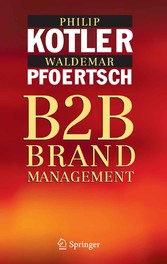Search and Find
Service
CHAPTER 1 Being Known or Being One of Many (p. 1-2)
"It is a capital mistake to theorize before one has data. Insensibly one begins to twist facts to suit theories, instead of theories to suit facts." Sir Arthur Conan Doyle (1859-1930), Sherlock Holmes
When talking about brands most people think of Coca Cola, Apple, Ikea, Starbucks, Nokia, and maybe Harley Davidson. These brands also happen to be among the most cited best-practice examples in the area of Business-to-Consumer (B2C) branding. For these companies their brand represents a strong and enduring asset, a value driver that has literally boosted the company’s success. Hardly any company neglects the importance of brands in B2C.
In Business-to-Business (B2B), things are different – branding is not meant to be relevant. Many managers are convinced that it is a phenomenon confined only to consumer products and markets. Their justification often relies on the fact that they are in a commodity business or specialty market and that customers naturally know a great deal about their products as well as their competitors’ products. To them, brand loyalty is a non-rational behavior that applies to breakfast cereals and favorite jeans – it doesn’t apply in the more "rational" world of B2B products. Products such as electric motors, crystal components, industrial lubricants or high-tech components are chosen through an objective decision-making process that only accounts for the so-called hard facts like features/functionality, benefits, price, service and quality etc. Soft-facts like the reputation of the business, whether it is well known is not of interest. Is this true? Does anybody really believe that people can turn themselves into unemotional and utterly rational machines when at work? We don’t think so.
Is branding relevant to B2B companies? Microsoft, IBM, General Electric, Intel, HP, Cisco Systems, Dell, Oracle, SAP, Siemens, FedEx, Boeing – they are all vivid examples of the fact that some of the world’s strongest brands are B2B brands. Although they also operate in B2C segments, their main business operations are concentrated on B2B. Then why are so many B2B companies spurning their fortune?
Take for instance the Boeing company. Only a few years ago a very interesting incident happened at the Boeing headquarters in Seattle. Shortly after Judith A. Muehlberg, a Ford veteran started as head of the Marketing and Public-Relations department, she dared to utter the "B" word in a meeting of top executives. Instantly, a senior manager stopped her and said: "Judith, do you know what industry you’re in and what company you’ve come to? We aren’t a consumer- goods company, and we don’t have a brand."2 Since then US aerospace giant Boeing has come a long way. Nowadays, branding and brand management do matter in a big way to them.
In 2000, the company’s first-ever brand strategy was formalized and integrated in an overall strategy to extend its reach beyond the commercialairplane business. Today, the brand spans literally everything from its logo to corporate headquarters. Even the plan to relocate its corporate headquarter from Seattle to Chicago has been devised with the Boeing brand in mind.3 In 2005, Boeing introduced its new flagship aircraft. In a worldwide campaign with AOL, they searched for a suitable name and invented the Dreamliner, which was inaugurated by Rob Pollack, Vice President of Branding for Boeing Commercial Airplanes Marketing.
All prices incl. VAT













